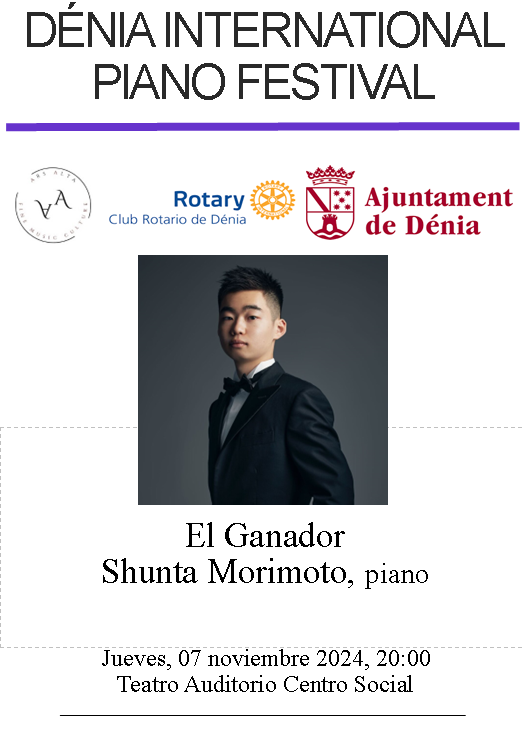I don’t normally write detailed reviews of chamber music concerts. It’s not because they often aren’t memorable, it’s just that I tend to go to so many of them, it’s often hard to keep up with the writing! This lack of motivation to put pen paper is especially marked when the repertoire on offer is very much standard, comprising often performed works that frankly I have heard many times. It’s not that familiarity breeds contempt. It’s just that what does one say about another fairly standard performance of a standard work, albeit that both the work and the performance are superb? Nearly all the performances I have heard over the years are wholly competent, with one or two exceptions, but it becomes hard to say anything new about them. So what is it about a concert that featured J. S. Bach’s French Suite No. 6 BWV 817, Chopin’s Opus 28 Preludes and Liszt’s Dante Sonata that has provoked me to write? Answer: the performer and the performance. Both were outstanding.
Shunta Morimoto is a young Japanese pianist. He was 19 when he won the Concurso de Piano Gonzalo Soriano in Alicante in April 2024. The competition is organized by Ars Alta Cultural in conjunction with Conservatorio Profesional de Música, Guitarrista José Tomás and this year there were over 100 entrants, with half of them competing in level D, the section for adults, whose age rage was from 18 to 32. Shunta Morimoto, therefore, was at the younger end of the range, and he was the youngest of the finalists. I have been listening to music intently for about 60 years. But I knew from the moment Shunta Morimoto depressed a key in that room in April that he would win the competition and, furthermore, that I was about to witness something wholly special. Put simply, Shunta Morimoto is a genius.
Part of the prize for winning the Gonzalo Soriano competition was to appear in the Ars Alta Cultural concert series in Denia at the end of 2024 and that concert, part of the Denia International Piano Festival, was last night. Shunta Morimoto offered the program mentioned above and, for perhaps the first time in thousands of concerts and recitals that I have attended, I can report that not one of the 110 or so people in the audience made a single sound, apart from applause, of course, throughout the one and a half hours of music. There was no interval, but amongst the audience, silence ruled, so utterly wrapt was everyone in what they heard.
It is hard to describe in words what is so compelling about this young man’s playing. The moment you hear the music, it is obvious, but written words have to be read, not heard. Many pianists use bravura, strength and volume to impress. Many play as fast as possible. Shunta Morimoto can offer bravura, the spectacular and the speedy. But above all what he can do is communicate via the music and it is this speaking, apparently directly to an audience without the need of words that is utterly captivating, even arresting.
Every phrase of every piece he played last night was shaped, thought through to make musical sense. At times, he played so softly the music was barely audible, but every note was there, every gesture was clear, every phrase fit perfectly with the musical argument he presented. Even the silences he interspersed for effect were listened to intently by a thoroughly captivated audience.
Chopin’s Opus 28 Preludes, perhaps, was never intended to be played as a single work. But in the right hands, even a composer’s lack of vision can be straightened. I am reminded of a performance about 30 years ago when Murray McLachlan played all the Etudes of Chopin end to end, Opus 25 followed by Opus 10. He was clear that it would not the other way round. I have never forgotten that performance on a baby grand Kawai in a Brunei Hotel. Last night, Shunta Morimoto knew that the Opus 28 Preludes could be played as a single work, and he was right. He succeeded completely.
The Liszt that followed, of course, was breathtaking. In any hands, this Dante Sonata is a real monster, requiring all the skills that a pianist can possibly muster to bring it off. Not only did Shunta Morimoto succeed, but he appeared to bring a new dimension to the work by shaping the quieter sections so finely and so eloquently. Earlier in the day, I had listened to two other performances, by Paul Lewis and Alfred Brendel, so the work was already in my head. Shunta Morimoto’s rendition made me feel like I was hearing it for the first time, so surprising did I find his nuances of interpretation. It was totally recognisable, but totally new at the same time. What a performance!
After a wholly spontaneous standing ovation, he offered the Chopin Barcarole as a substantial encore. Shunta Morimoto, for sure, is a unique talent. He surely has a stellar career ahead of him, and richly deserved. Special.










